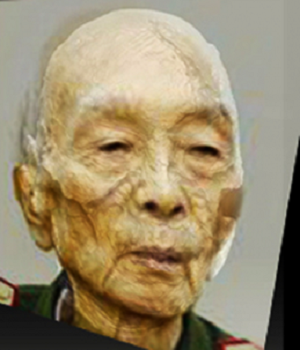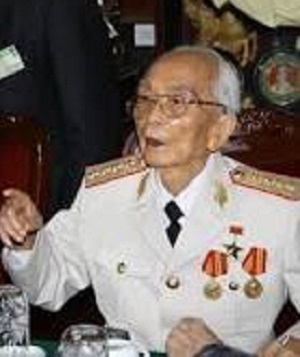Thoughts on General Giap
Huỳnh Thục Vy
October 14, 2013
[English Version by Chấn Minh/Việt Thức]
http://www.vietthuc.org/2013/10/12/vai-suy-nghi-ve-ong-giap/


The general considered by many communists as the last surviving “founding father” of the regime passed away on October 4. And so, the one who was a living symbol of the fight that went into the “struggle for independence” and the ideals of the “revolution”, and the nominal monument to a “heroic age” of communism has moved on. Dust to dust.
He has truly left the scene and taken his leave of this world full of madness and treachery. No one knows where he will end up, but the legacy he left behind is filled to the brim with suffering and strife and includes a Vietnam where unheeded cries against injustice could be heard everywhere. Anyhow, let’s wish that his departure was calm and peaceful, even if he was silent and unfeeling when others passed away in ways that were tragic and heart rending.
Considering that he was a founding father of the Vietnamese communist state, it might be unnecessary to debate whether he had or didn’t have an ideal, or to assess the necessity of the meaningless wars in which he served as the supreme commander. Instead, history must demand that he bear the full responsibility for the silence he maintained when confronted with the unjust, treacherous, and painful history that the Vietnamese people had to endure.
Quite a few individuals have praised Mr. Giáp as a great intellectual and a cultural icon. I don’t want to add to or comment on these praises. The historical records are fully available out there for research or attempts to understand him. Instead, I want to ask just one question: What did he do when lawyer Nguyễn Mạnh Tường called for a government based on the rule of law before he was to be demoted and persecuted? If Mr. Giáp were truly a great intellectual, shouldn’t he know how indispensable was the rule of law to a nation long before the elderly Mr. Tường called it out, because the damages communism could and did inflict on the nation are out there for all to see? If Mr. Giáp is ignorant of the deficiencies of communism, how could he be called a great intellectual? And even if we assume that Mr. Giáp knew nothing about dictatorship and democracy, but when lawyer Tường spoke up and advocated for a a civil society and he, Mr. Giáp, remained silent and didn’t make a single move, how could we say that he exhibited greatness of character?
Moreover, where was he and what was he doing when Nguyễn Hữu Đang, Trần Dần, and Hữu Loan were publicly denounced, condemned, and persecuted? Did he feel shame, was his heart moved, and was he convulsed, when millions of South Vietnamese fled the country in bitter tears as the Republic of Vietnam fell and was forcibly taken over, or when thousands among these millions perished at sea? What did he think when General Trần Độ courageously spoke up in protest, only to be repressed himself? What did he do when the elderly Hoàng Minh Chính spoke out in dissent and was jailed? Mr. Giáp stood on the sidelines as countless painful events swept through the country. Were the positions he took worthy of an intellectual?
It doesn’t matter who they are, but when someone passes away, one should pray for his/her peaceful departure. And so I was very hesitant when writing these lines. Should I write bitter words about a man who just died? Should I enumerate the wrongs he did when forever he could any longer defend himself? From the bottom of my heart, the truth is I don’t write these lines to take aim at Mr. Giáp. I write these lines for the living. I write these lines for those who are still confused and blinded by the brilliant illusion that the communists have managed to conjure. I write them for the majority of the young people in Vietnam who still live and breathe under the spell of that fraudulent illusion, and who have neither the desire nor the will to escape from it.
Mr. Giáp, the “great general” in the eyes of many young Vietnamese, is a man who contributed mightily to the creation of this brutal totalitarian regime and who defended it very well. He lived a very long life, well past the “rare ripe old age of seventy”, and died in the loving embrace of his family clan and the esteem and respect of many. But did he know that, while the man who helped build a vast criminal regime could die in peace and glory, those victimized by the same regime saw their families descend into misery and tragedy, before they too had to pass away, not in peace and glory, but with their heart weighed down by the injustice and humiliations they had to bear while alive?
One of these victims was a kind and industrious man, Mr. Đặng Ngọc Viết, who killed himself with a bullet to the heart after the persecutions he received pushed him over the brink of sanity and led him to kill a government official in the province of Thái Bình. Or it is Mr. Thomas Nguyễn Tự Thành, a boat people forcibly repatriated to Vietnam from Thailand, and who hanged himself on October 3, just one day before Mr. Giáp died, because he could no longer endure the economic restrictions and the persecutions the communist government heaped upon him? Why was Mr. Giap honored when he himself was a part of the reasons why these two painful deaths occurred?
Obviously, It has been quite a while since Mr. Giáp was one of the leaders of the country, and he didn’t participate in formulating and carrying out the policies and the actions of the government. But, and precisely because of his heroic past and his irresponsible present, he provided legitimacy to the current and cruel regime. This regime used him to prop up, defend, and justify acts that are harmful to the people and the country. He was the lifebuoy that the communist leaders cling to when they must face the indignation of the people. I don’t know if old age sapped his will, or if fear corroded his conscience, or if concerns for the future riches and glories of his children and grand children dissolved his sense of responsibility, but to the very last of his years on earth, he remained silent as the country writhed in pain under the totalitarian government, and he allowed those who ran the state to use him to prop up their inhuman regime. (Only once did he raised a voice, albeit a weak one, to protest the exploitation of bauxite in the Highlands of Central Vietnam).
If he had spoken out in favor of human rights and freedom, then his voice would have had a strong and positive effect on the conscience of the young people and he could have changed the minds of many who were deceived. Isn’t it true that a General Giáp will surely be more able and effective in waking the people up from their stupor and in shaking up the communist party than a Lê Công Định, a Phạm Hồng Sơn, a Huỳnh Ngọc Tuấn, a Phạm Thanh Uyên or a Phương Uyên? Instead, Mr. Giáp chose to live curled up inside a cocoon of his own making and then die among all the flags and the pomp and flourishes that the communist regime could muster. He did not choose to live the life of a man who would wake up to and return to the truth, embrace it, and then die fighting for it as a freedom fighter. One would think that old age should allow a man to become fearless, or to push the boundaries of fear farther away. Yet he chose to embrace fear as his companion when he departed this world.
There are those who said: we are not in his shoes and so it is impossible for us to fully understand what he had to face. Right! We aren’t in his shoes and we don’t understand the situations he was in. But can we really understand the situations of the students who, because they participated in demonstrations to show their love for the country, were expelled from their schools and thus forfeited their future? And can we really put ourselves in the shoes of Phương Uyên, the young woman who endured countless attacks and threats – both physical and mental – when she was arrested and jailed, when all she did was to show her patriotism? And then there are many other dissidents who were subjected to harsh prison sentences, denied life with their spouses, and condemned to have their children grow up derelict and uneducated, only because they dared speak up for democracy and freedom? Was Mr. Giáp really placed in situations more dire that the ones I just described? Or, to make it simpler to visualize, were the situations he was in more difficult than those of General Trần Độ and the elderly Hoàng Minh Chính? I believe that the real issue is one of conscience, capability, and character!
He passed away and left everything behind: a totalitarian regime that lingers on, lives parsed and darkened under crushing injustice, repressions that never end, and deaths that can’t be defended or justified…But these words are not meant to condemn him. In truth, all values are relative in this real world of flesh and blood. But, there are ways to tell TRUE greatness – in intellect as well as in personal conduct – from its FALSE DEPICTION. I pray for his peaceful passing and I want him to know that I feel deep compassion for him, for he was fated to have a complex and multi-faceted life in this unenlightened world. However, I wish to reserve my respect for the men and women who choose to, or try to, live and die according to the dictates of their conscience, their sense of responsibility, and the truth. Vietnam still has many such men and women, and for them we shall reserve our heartfelt praise and admiration. But Mr. Giáp was just not one of them.
Huỳnh Thục Vy
http://www.vietthuc.org/2013/10/12/vai-suy-nghi-ve-ong-giap/













































